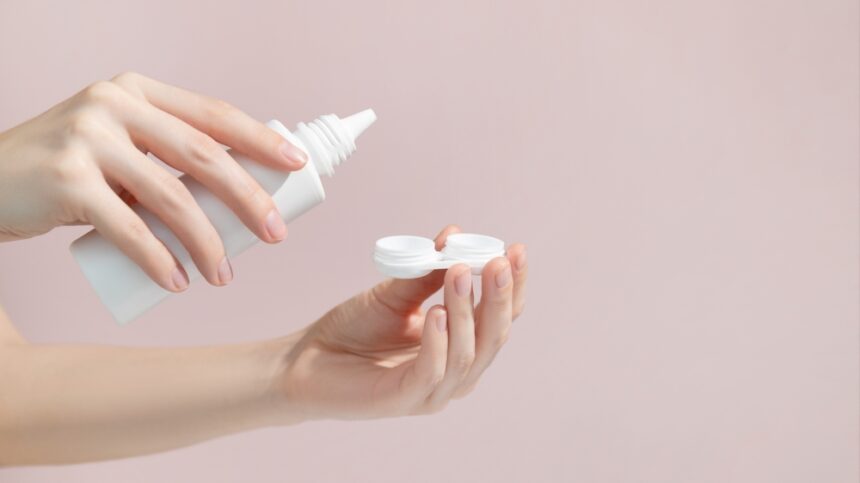Your eye health is a top priority, but you don’t always know what to do if you have vision problems. This can be especially true if you have farsighted vision issues. The National Eye Institute estimates that between 5% and 10% of people have farsighted vision problems. This figure is not likely going to drop anytime soon.
- 1. Wash Your Hands Properly
- 2. Use the Right Contact Lens Solution
- 3. Clean and Disinfect Your Lenses Daily
- 4. Use a New Pair of Lenses Regularly
- 5. Do Not Expose Your Lenses to Water
- 6. Don’t Wear Your Lenses for Too Long
- 7. Protect Your Eyes From Dust and Pollution
- 8. Visit Your Optician Regularly
- 9. Avoid Cosmetic Products
- Maintain Clear Vision While Wearing Contacts for Farsightedness
Fortunately, there are a lot of things that you need to do if you have vision problems. One of the most important things that you can do is make sure that you have the right contacts. You should also follow our other tips to protect your eye health.
Farsightedness is a common refractive error in which a person can see distant objects but has problems with near vision. Fortunately, contact lenses are available for individuals with farsightedness, making it easier for them to see clearly. They need to know how to buy them as well as take care of them.
However, caring for contacts can be a challenge, particularly for those who are new to wearing them. In this blog post, we will discuss ten ways to properly care for your contacts for farsightedness.
These tips will help you maintain the longevity and effectiveness of your lenses and avoid any complications that may arise. So, without further ado, let’s dive in!
1. Wash Your Hands Properly
One of the easiest ways to avoid eye infections when using contact lenses is by washing your hands. Before touching your contact lenses or your eyes, wash your hands with soap and water to remove any dirt, grime, or bacteria that might have accumulated on your hands. Additionally, make sure you dry your hands with a lint-free towel so you don’t transfer any germs to your eyes.
According to The American Academy of Ophthalmology, hand hygiene is critical to preventing eye infections linked to contact lenses. Therefore, take the time to wash your hands as frequently as possible to maintain the highest level of hygiene.
2. Use the Right Contact Lens Solution
Choosing the right contact lens solution is paramount to preserving the longevity of your contacts as well as ensuring that your eyes stay healthy. Always use a solution that is recommended by your optometrist for cleaning and disinfecting your contacts. Don’t use water or saliva to clean your contacts, as these can introduce harmful bacteria into your eyes.
Additionally, ensure you replace your solution every time you clean your contacts, as storing your contacts in dirty or old solutions can lead to bacterial growth and eye infections. Honouring the prescribed replacement schedule for your solution’s container is just as essential too.
3. Clean and Disinfect Your Lenses Daily
Remove your lenses from your eyes and clean them with a recommended cleaning solution that you can buy from your optometrist. Rub the lenses to remove any buildup, then rinse them in a fresh solution.
After cleaning, store the contacts in a clean case filled with fresh solution. Remember to replace the solution in your case every day and avoid topping off the old solution with a new solution.
4. Use a New Pair of Lenses Regularly
Using a new pair of contact lenses is another way to take care of your eyes. Old and worn lenses can cause mild discomfort and increase the risk of eye infections. Most contact lenses have a lifespan of about 1-2 weeks, depending on the type and brand.
You should replace your lenses and lubricate your eye as recommended by your eye doctor or the manufacturer. When you get a new pair of lenses, make sure to check their expiry date.
Expired lenses can cause eye infections and other eye problems. Also, don’t reuse disposable lenses or share your lenses with other people. Sharing lenses can cause eye infections and is not safe.
5. Do Not Expose Your Lenses to Water
Contact lenses should never be exposed to water, including tap water, swimming, or showering. The reason is that the water may contain a microorganism called acanthamoeba, which can cause an eye infection that leads to permanent vision loss.
If water comes into contact with your contacts, you should immediately take them out and disinfect them using the recommended contact solution. As a precaution, you should also avoid wearing your contacts when going for a swim and switch to prescription goggles instead.
6. Don’t Wear Your Lenses for Too Long
Wearing your contacts for too long can cause discomfort and damage your eyes, especially in the case of farsightedness. You should stick to the recommended wear time provided by your optometrist.
This time usually ranges from eight to ten hours each day, but it’s best to confirm with your eye doctor. If you continue to wear your contacts for longer than recommended, it can cause redness, dryness, and irritation in the eyes, and can even increase the likelihood of getting an infection, which would increase the risk of your eyesight deteriorating.
7. Protect Your Eyes From Dust and Pollution
Air pollution is harmful to your eyes, especially if you are wearing contacts. Environmental pollutants can cause various problems such as redness, irritation, dryness, and swelling of the eyes. Protect your eyes from dust and pollution, especially if you live in populated areas or when doing outdoor activities, such as gardening or mowing the lawn.
Wearing sunglasses or goggles is recommended to protect your eyes from foreign debris. Additionally, use hypoallergenic cleaners when cleaning your contact lenses, and avoid touching your eyes with dirty hands. Remember, contact lenses can collect dust, which can lead to eye infections.
8. Visit Your Optician Regularly
Your optician can provide valuable advice on how to wear and care for your contacts, ensuring they are effective in improving your vision. They can also teach you how to tell if the contact lens is still in the eye, as sometimes they can become dislodged or lost. Regular visits to your optician can help catch any issues early on and ensure your contacts are fitting and meeting your vision needs.
9. Avoid Cosmetic Products
This includes anything that comes into contact with your eyes, such as makeup, lotions, and creams. These products contain oils and other substances that can build up on your contacts and cause irritation or infection.
If you must wear makeup or skin products, make sure to clean your hands and face before handling your contacts. Additionally, use oil-free and fragrance-free products to cut the risk of contamination.
Maintain Clear Vision While Wearing Contacts for Farsightedness
Taking proper care of your contacts for farsightedness is crucial for ensuring clear vision and healthy eyes. By following these simple steps, you can prolong the life of your contacts and avoid potential eye infections. Remember to always consult with your eye doctor for any concerns and schedule regular check-ups.
Take care of your contacts, and they will take care of your eyes. Don’t neglect your eye health – make it a priority today.
Looking for more tips and advice? You’re in the right place! Make sure to bookmark our page and come back to check out more interesting articles.









